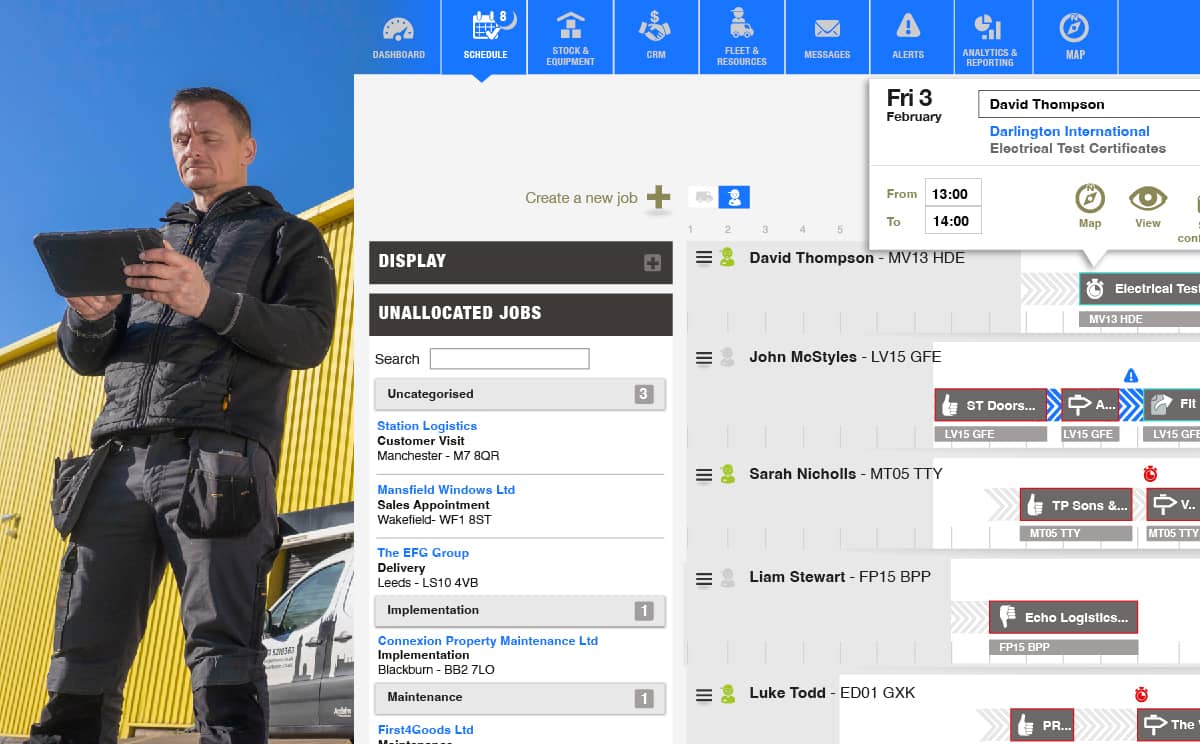What is the Importance of Job Management Software?

In 2020, a quarter of field service organisations still relied on spreadsheets for job management, while the remainder used whiteboards and other manual methods. However, as the COVID-19 crisis demonstrated, technology has the potential to remodel and improve working practices.
Therefore, to stay ahead of the curve and avoid becoming obsolete in an increasingly digital world, businesses must consider modern ways to make their processes more efficient.
In this article, we'll explain the importance of job management software and share how intelligent scheduling can maximise efficiency to benefit your business.
What is Job Management Software?
Efficient job management is critical to maintaining the workflow and creating order within your organisation. Everyone knows what they're supposed to be doing, when they're supposed to be doing it and where, allowing them to concentrate on delivering exceptional service to your customers.
Job management software revolutionises the way field service businesses schedule their technicians' time. Unlike unmanageable legacy systems and manual, paper-based methods, modern technology gives you access to real-time data. As such, you can rapidly respond to customer requirements and assign the perfect resource for the job every time.
The system also takes location, traffic information, job constraints and vehicle type into consideration to lower costs, optimise travel distance and improve productivity.
How Intelligent Scheduling Can Benefit Your Field Service Business
Since so many businesses bank on manual processes to maintain their job schedule, it's not surprising that scheduling and dispatching difficulties present one of the top challenges to field service operations.
That's where job management software comes in. By making use of technology to optimise your resources, you could enjoy the following benefits:
1. Lowered Travel Costs
With petrol prices skyrocketing to an eight-year high in the UK, field service companies will need to devise new ways to optimise their engineers' journeys. But, it can be tricky to plan routes effectively using traditional methods, and businesses who don't modernise may find that they're losing profits unnecessarily.
Instead, when you use an intelligent scheduling assistant, you'll be able to see technicians' locations in real-time so you can deploy them to nearby customers, reducing their fuel consumption.
Plus, you can optimise hundreds of jobs instantly. The system will calculate the overall 'cost to serve' per job and provide hints that enable you to lower the travel expenses associated with each project.
As a result, you'll find that field engineers' journeys are far shorter, and they need to fill up their tanks less frequently.
2. Maximised Efficiency and Productivity
According to research, businesses waste an astonishing 140 hours per year by creating a manual job schedule. Burdensome administration tasks act as a morale killer for your team, lower productivity levels and increase the margin for error.
At worst, unfulfilling work can result in a high staff turnover.
Spending so much time on laborious, ineffective processes and recruiting replacement employees takes time away from more business-critical tasks and stunts company growth.
In contrast, state-of-the-art job management software allows your team to complete tasks, such as booking recurring jobs and sharing electronic documents, at the touch of a button. Eliminating the error-prone and arduous aspects of scheduling workers' jobs frees up more time for your back-office staff to focus on what they do best.
Additionally, using an intelligent scheduling assistant to optimise technicians' routes not only saves on fuel costs but also enhances productivity. Less time spent travelling per day provides more opportunities to complete more jobs and boost your bottom line as a result.
3. Increased First-Time Fix Rates
Let's imagine for a moment that your engineer, Claire, has just finished working on a job. She checks her schedule and heads to the next project your team assigned to her nearby. Your customer shows Claire the problem, which is an easy fix. Claire heads out to her van to get the parts she needs but soon realises they're not there.
Consequently, Claire has to come back later after picking up the correct parts. Apart from being inconvenient for both parties, failure to complete a job first-time is costly and unproductive.
When using job management software, you can increase first-time fix rates by assigning items directly to jobs. With complete visibility over your workers and their equipment, you remove the risk of a technician turning up to a project without the gear they need to complete it the first time.
4. Better Workflows
45% of technicians report that their current tools aren't fast enough, and a further 38% say they can't access all the information they need. As a consequence, they have to take time out of their day to hunt down vital details and manually share job status updates with the back-office team using outdated methods of communication.
In comparison, job management software ensures that communication between technicians, your back office and customers is seamless. You can create simple, step-by-step workflows that mandate tasks against your standard processes. Technicians can then effortlessly capture additional information, such as photos, from the client site to create and share electronic documents instantly.
Maximise Efficiency with BigChange's Job Management Software
Provide excellent service on schedule. Every single time.
BigChange's intelligent scheduling assistant provides you with live data. Therefore, you can make informed decisions about the best resource for each job, reducing time spent on the road, increasing productivity and lowering travel costs.
Want to find out more?
Discover how BigChange field service management software can make your business grow stronger here and arrange a freedemo today.





